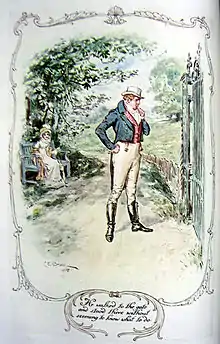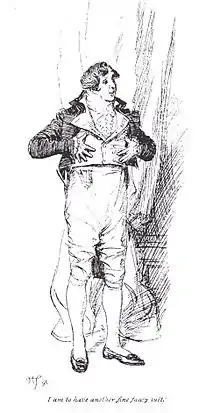Mr. Rushworth
Mr. James Rushworth is a character from Jane Austen's 1814 novel Mansfield Park. Mansfield Park is about a young girl, Fanny Price, who goes to live with her wealthy relatives, the Bertrams. The novel follows the familial life and social circle of the Bertrams. Rushworth is part of this circle. He is the son of Mrs. Rushworth and has inherited Sotherton Estate, an estate of about seven hundred acres.[1] He has 12,000 pounds a year, which makes him a very eligible bachelor.[2] He is the fiance of Maria Bertram who is the eldest daughter of Sir Thomas Bertram.
| James Rushworth | |
|---|---|
| Jane Austen, Mansfield Park character | |
 | |
| In-universe information | |
| Full name | James Rushworth |
| Position | Owner |
| Relatives | mother: Mrs Rushworth |
| Home | Sotherton Court |
Background
Jane Austen was born in December 1775 and died in July 1817. She was a British novelist who wrote six novels: Sense and Sensibility, Pride and Prejudice, Mansfield Park, Emma, Persuasion, and Northanger Abbey. Her novels are about romance within the gentry.
Mansfield Park was written between 1811 and 1813 and was published in 1814. The novel was published in a second edition in 1816. The novel is about a young woman, Fanny Price, and her life living with her relatives, the Bertrams. It catalogs the events that occur there and Fanny's insights into the characters and events.
Little is known about Rushworth before he comes into the company of the Bertrams. The only information given to us is that Rushworth is an eligible young bachelor who has recently come into a great fortune. The reader knows he has a large park and a Tudor mansion.[3] This information is sufficient for the reader as to his history and the reader doesn't really need his history for his place in what follows.
Characterization
Austen describes Mr. Rushworth as "a heavy young man, with not more than common sense".[4] Mr. Rushworth is perceived by all the characters, with the exception of his mother, as a fool.[2] He is described by Joseph Donohue Jr. as a "wealthy simpleton".[5] Sir Thomas notes that he has no eye for business.[6] He doesn't know how to act in society or what the appropriate action is for most situations. He is "unaware and oblivious" to much of what goes on in Mansfield Park.[7] When Maria Bertram and Henry Crawford run off behind the gate after Rushworth has left to get the key for the said gate at Sotherton estate, Fanny has to tell him to follow them because he just sits there, not knowing what to do.[8] Mr. Rushworth also has trouble learning and remembering his lines for Lovers' Vows, a play that the Bertrams and some friends wanted to perform.[9] He is insensible to the fact that his fiancee is indifferent to him and is flirting with Henry Crawford; although he does have some grudge against Henry, stating that he is too short to be handsome.[10][11]
Relationship with Maria Bertram
Within the first few chapters of the novel, Mr. Rushworth becomes engaged to Maria Bertram. He notices how beautiful she is and soon fancied himself in love.[4] However, since Sir Thomas Bertram is away in Antigua, Mr. Rushworth has to wait to marry Maria until he returns.[12] When Sir Thomas returns he notices that his daughter is indifferent to Mr. Rushworth and seems to prefer Henry Crawford. However, after Crawford leaves, Maria has no choice but to marry Mr. Rushworth. Mr. Rushworth and his new bride go to Wimpole Street after their honeymoon.[13] There they entertain high society and Maria is much pleased with herself to run her own house. However, Henry Crawford's charms once again seduce her and she runs away with him. At this disgrace, Mr. Rushworth attains a divorce and it is presumed he will find someone else to marry.[14]

Place in Plot
Mr. Rushworth plays a minor, yet important role in the novel. After Mr. Rushworth gets engaged to Maria, he begins to think about improvements for his estate.[15] He invites most of the Bertram household, as well as the Crawfords to his estate to examine it and see what improvements can be made.[16] As the party arrives at the house, he greets them with the utmost cordiality. When everyone goes outside, he is accompanied by Maria and Mr. Crawford.[17] He runs off to go fetch the key for a gate, while Maria and Henry slip through and go off on their own.[18] When Rushworth comes back, he isn't quite sure what to do; he doesn't know whether he should stay or go after them.[8] He finally goes after him, but isn't happy with what he finds. However, he perked up when Henry picked Julia to sit with him as they left Sotherton.[19] Mr. Rushworth took part in the play Lovers' Vows, which was a controversial act in the Bertram household because Sir Thomas would never have allowed such frivolity to occur. However, he was too engaged in the finery which he was to wear than to take note of what else was going on, specifically the flirtation of Maria and Henry.[20] He has a lot of trouble learning his lines and it is unlikely that he ever learned them and later he tells Sir Thomas that he thought the play was a bad idea to begin with.[9] Later on, Mr. Rushworth marries Maria and the pair, along with Julia Bertram (Maria's sister) go to Brighton and later London.[13] However, by the end of the novel, he gets a divorce from Maria.[14]
Portrayal in Movies
In the 1983 PBS mini-series of Mansfield Park, he is played by Jonathan Stephens.[21] In the 1999 version of Mansfield Park, Mr. Rushworth is played by Hugh Bonneville.[22] He is portrayed as a man of little sense who greatly cares about his social image. In the 2007 film of Mansfield Park, he is played by Rory Kinnear[23] and is portrayed as a fool.
References
- Austen, Jane (1998). Mansfield Park. New York: W.W. Norton & Company, Inc. p. 41.
- Austen, Jane (1998). Mansfield Park. New York: W.W. Norton & Company, Inc. p. 30.
- Wiltshire, John (1997). The Cambridge Companion to Jane Austen. Cambridge: Cambridge University Press. p. 59. ISBN 9780521498678.
- Austen, Jane (1998). Mansfield Park. New York: W.W. Norton & Company, Inc. p. 29.
- Donohue, Joseph (1965). "Ordination and the Divided House at Mansfield Park". ELH. 32 (2): 172. JSTOR 2872214.
- Austen, Jane (1998). Mansfield Park. New York: W.W. Norton & Company, Inc. p. 137.
- Shmoop Editorial Team. "Mr. Rushworth in Mansfield Park". Shmoop University, Inc. Retrieved 21 March 2014.
- Austen, Jane (1998). Mansfield Park. New York: W.W. Norton & Company, Inc. pp. 72–73.
- Austen, Jane (1998). Mansfield Park. New York: W.W. Norton & Company, Inc. p. 115.
- Austen, Jane (1998). Mansfield Park. New York: W.W. Norton & Company, Inc. p. 73.
- Austen, Jane (1998). Mansfield Park. New York: W.W. Norton & Company, Inc. p. 128.
- Austen, Jane (1998). Mansfield Park. New York: W.W. Norton and Company. pp. 29–30.
- Austen, Jane (1998). Mansfield Park. New York: W.W. Norton & Company, Inc. pp. 139–140.
- Austen, Jane (1998). Mansfield Park. New York: W.W. Norton & Company, Inc. p. 315.
- Austen, Jane (1998). Mansfield Park. New York: W.W. Norton and Company. pp. 38–41.
- Austen, Jane (1998). Mansfield Park. New York: W.W. Norton and Company. pp. 54–55.
- Austen, Jane (1998). Mansfield Park. New York: W.W. Norton and Company. p. 69.
- Austen, Jane (1998). Mansfield Park. New York: W.W. Norton & Company, Inc. p. 70.
- Austen, Jane (1998). Mansfield Park. New York: W.W. Norton & Company, Inc. p. 75.
- Austen, Jane (1998). Mansfield Park. New York: W.W. Norton & Company, Inc. p. 97.
- , "Mansfield Park", 1983, BBC Miniseries, Directed by David Giles.
- , "Mansfield Park", 1999, Directed by Patricia Rozema.
- , "Mansfield Park", 2007, Directed by Iain MacDonald.
Other Readings
- Laurie Kaplan, “The Rushworths of Wimpole Street”, 2011:
- Svenja Strohmeier, “Jane Austen’s Representation of Morality and Conduct in “Mansfield Park” and “Persuasion”, 2013:
- Wikipedia, Mansfield Park, 2014: Mansfield Park